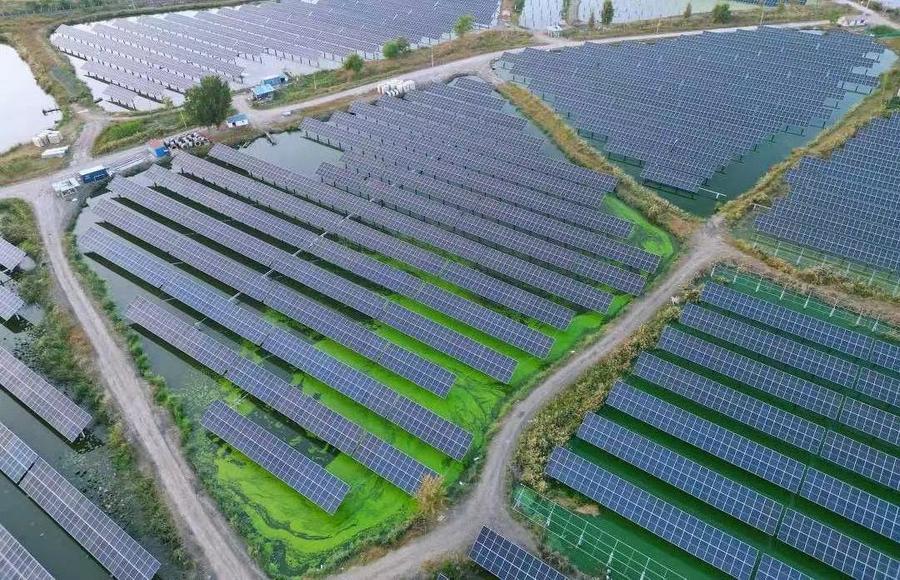
 0 Comment(s)
0 Comment(s) Print
Print E-mail China Daily, May 8, 2024
E-mail China Daily, May 8, 2024

This aerial photo taken on July 17, 2023 shows the newly built solar farm of Tianjin Yinghua New Energy Technology Development Co., Ltd. in north China's Tianjin. [Photo/Xinhua]
China's supply of green products like new energy vehicles and lithium batteries would be "dynamically balanced" at the global level and help other countries to achieve their green transformation goal, provided there is no spillover of geopolitical tensions and protectionism, said renowned economists, political advisers and foreign investors.
"China's green industry, represented by new energy vehicles, solar panels and lithium batteries, now boasts the highest quality and the lowest production costs. Other countries across the world can benefit from these advantages and achieve their own green goals at the lowest cost possible," said Justin Yifu Lin, a former World Bank chief economist and a member of the Standing Committee of the Chinese People's Political Consultative Conference National Committee.
Lin, who is also dean of Peking University's Institute of New Structural Economics, said in an exclusive interview with China Daily that China hopes that the technological advancements the country has achieved can drive not only its development but also that of other economies.
Faced with global economic slowdown, if a country wants to be competitive in both domestic and international markets, it is essential to have new technologies and products with "high quality, and reasonable prices", Lin said.
"China, in this regard, has such advantages and by combining these industrial advantages together, the country is able to help drive high-quality economic development globally."
He made the remarks in the context of the world moving a step forward toward green energy revolution and sustainability. But some markets like the United States are trying to manufacture a controversy by harping on the so-called overcapacity issue in China's "new three" industries — new energy vehicles, lithium-ion batteries and photovoltaic products.
Li Daokui, director of Tsinghua University's Academic Center for Chinese Economic Practice and Thinking, told China Daily that the row over overcapacity, fundamentally, is a divergence from "globalization".
"China hopes to continue promoting globalization, drive new energy product exports and continue the large-scale circulation of advanced equipment or raw materials from abroad. However, many Western countries are reluctant to participate in this circular process," he said.
According to the International Energy Agency, global renewable energy capacity is expected to grow by two-and-a-half fold by 2030, but governments need to go further to triple it by then.
Over the past year, higher inflation and high interest rates have also increased equipment and financing costs of renewables projects — and policies have been slow to adjust to the new macroeconomic environment globally, the IEA said.
But, China's role is "crucial" in reaching the 2030 goal because it is expected to install more than half of the new capacity required globally by the end of the decade, it said.
Li said some Western countries are viewing China in a static way without considering that its "new three "industries, especially the NEV sector, is developing dynamically.
"They were like the amateur spectators watching a gymnast perform a complex routine. They fear the gymnast might fall midway through, yet fail to witness the smooth landing as the gymnast adjusts," he said.
"China's NEV sector, for instance, will go through a big round of adjustment this year, eliminating many less competitive companies in the sector. Both investors and local governments are fully prepared for such a production capacity adjustment."
Similar views were expressed by Alex Gemici, chairman, CEO and founder of Greenstone Equity Partners, one of the largest capital-raising firms in the Middle East. He said he did not see China overproducing, selling or dumping cars abroad to corner the market.
"Any oversupply issue is very temporary, and the market will correct itself. Either the demand will go up or supply will correct itself to keep balance. I'm not worried about that at all."
A veteran investor, Gemici said it is critically important for the world to switch over from fossil fuels to EVs amid climate change and many other reasons.
Go to Forum >>0 Comment(s)